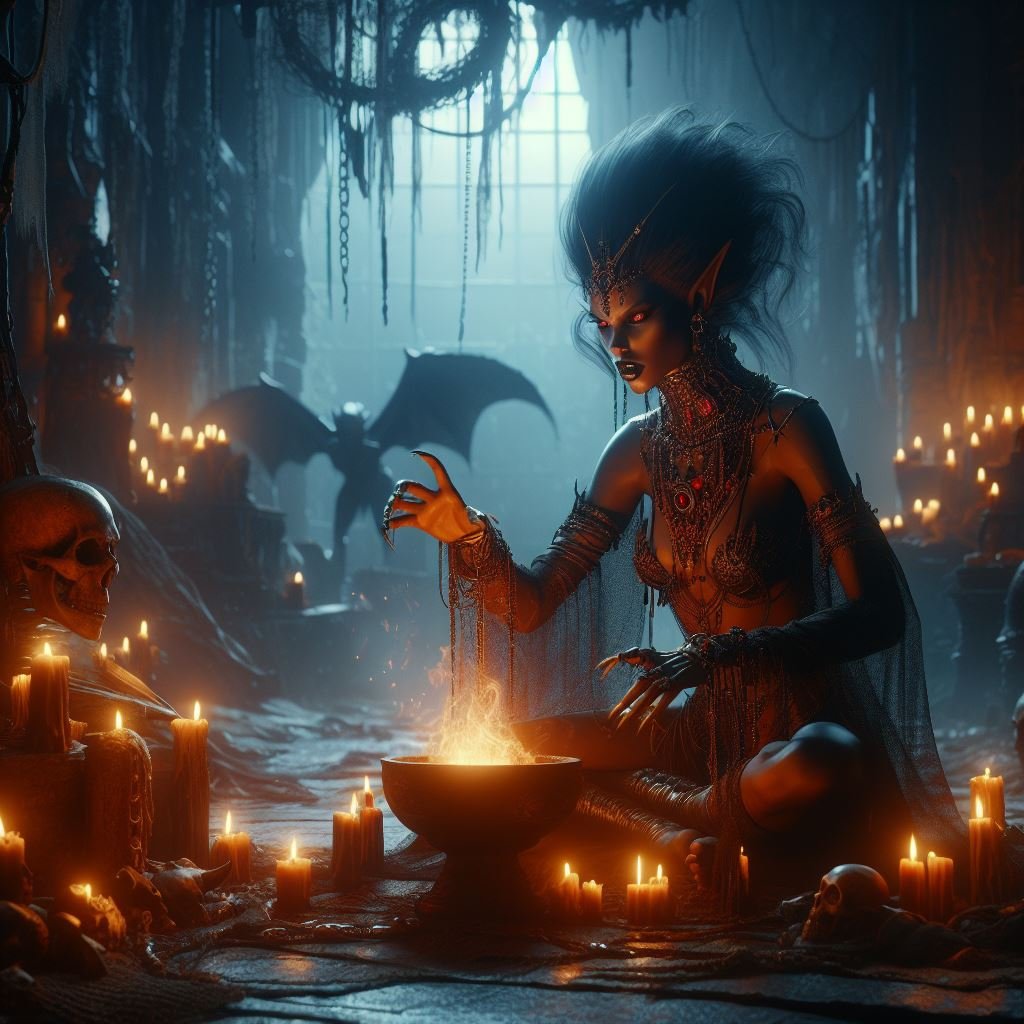Vampirism
Vampirism presents itself in a variety of different forms, from a simple disease to a more worrying ritualistic affliction. The affliction in most regards is transmitted through bites and inflected blood, but has been known to be done so through the use of magic. Whilst a bite from a vampiric source isn't seen as certain doom, it is still considered a very unfortunate event.
Overview
The true origins of vampirism are not known, but are considered by many to be the work of the evil deities during their phasic shifts as they were taught magic when they were still Titans. Not many seek true vampirism, but do idolise the eternal life that comes as part of the affliction. This idea leads a lot to experiment with vampirism, the act of which is highly illegal within most territories. These experimentations have led the world to having many new problems, as well as the introduction of a half breed, the Dhampir.
Scientifically the affliction is known as Porphyria Morbus, pronounced por-phyr-i-a more-bus.
Test subjects infected with the affliction willing have demonstrated a weakness to the UV rays, a loss of control of their own mind, and urges to feed on the blood of other creatures. The progression of Vampirism isn't kind and most of the time when someone is bitten within a society, if no treatment is available, they will be mercifully killed.
Types of Vampires
For millennia, tales of blood-sucking fiends have chilled the spines of mortals. But vampires are far from a monolithic race. Beneath the chilling façade lurks a diverse web of undead beings, each with their own motivations, strengths, and weaknesses. Vampires can be broadly categorised into four main classifications: Non-Sentient, Semi-Sentient, Sentient and Major Entities. Sentient vampires retain their intelligence and personality from their mortal life, while Non-sentient vampires are driven purely by instinct.
Here's a full breakdown of each type of vampire:
Non-Sentient Vampires
Non-Sentient are driven purely by instinct and hunger, lacking the intelligence or self-control of their sentient counterparts.
Animal Vampires: Once ordinary animals twisted by the curse, these creatures retain some animalistic behaviours but crave blood above all else.
Semi-Sentient Vampires
Semi-Sentient vampires retain some fragments of their former selves, but their intelligence and sanity are teetering on the edge.
Feral Vampires: Once human or sentient beings, Feral Vampires have been consumed by the curse. They are savage and unpredictable, driven by base hunger and instinct.
Sentient Vampires
These vampires retain their intelligence and personality, though forever altered by the curse. They grapple with their monstrous nature and often possess unique vampiric abilities.
Classic Vampire: The sophisticated and cunning vampire, often depicted with a seductive charm that masks their predatory nature. They have the ability to blend into human society, manipulating others to get what they want. Vampire Thrall: A recently turned vampire, struggling with their newfound hunger and urges. They may retain some of their humanity but are beholden to their sire or mistress, the vampire who turned them. Vampire Hunter: A rare breed who dedicate their existence to hunting and destroying other vampires. Their motivations can vary, from vengeance to a twisted sense of justice. Dhampir: The offspring of a vampire and a human, Dhampirs inherit some vampiric traits but are not completely succumbed to the curse. They can sometimes walk in the sunlight and may even possess a natural resistance to vampiric abilities.
Known Vampire Factions
 - [ ] Known Vampire Factions (Blackened Leaves / Phantom Council)
- [ ] Known Vampire Factions (Blackened Leaves / Phantom Council)
Major Vampire Entities
These are the most powerful and ancient vampires, beings of immense power who may inspire or command legions of lesser undead. Known major entities within Inventa include, but are not limited to:
- Zogoroth - Vampiric Demon Lord
Countering Vampirism
Vampirism, like other afflictions can be countered if the appropriate steps are taken in time. Whilst it is not necessarily the most comfortable situation to find oneself in, removal of an affliction can for the most part give the subject a normal life.
Method 1: Removal of the Affliction
To counter the ill effects of the vampirism disease two spells must be cast in quick succession one after another. The afflicted must be restrained to the point at which they start to starve and then the spells are cast whilst in the weakened state.
The spells required are Remove Curse to eliminate the protective magical barrier that the disease possess, followed by Remove Disease.
The DC for the disease is the same as the current manifestation DC the afflicted party has obtained.
Method 2: Resurrection
Whilst casting resurrection on a vampire will kill them, should you kill a person with vampirism and then cast resurrection, true resurrection or any spell that restores the party to life, they will not return with the disease.
Mechanics of Vampirism Progression (Homebrewed)
The official pathfinder rules of the Vampirism affliction can be found underneath the corruptions section on aonprd.com. The following rules are what are used within Inventa and should be done so consistently throughout.
Catalyst
Being bitten by a vampire or a vampiric entity and failing the appropriate Fortitude save as you attempt to fight off the affliction will infect you with the affliction. This then becomes a management system for both the player and the gamemaster. To make things easier here are several tables and resources to help with determining DCs and working out what happens during play.
| Bitten By | Fortitude Save DC | What Section Does This Link To? |
|---|---|---|
| Animal Vampire | 0 + Creature's CR (Minimum 5) | Non-Sentient Vampires |
| Magical Beast Vampire | 5 + Creature's CR (Minimum 10) | Semi Sentient Vampires |
| Feral Vampire | 10 + Creature's CR (Minimum 12) | Semi-Sentient Vampires > Feral Vampires |
| Full Sentient Vampire | 15 + Creature's CR (Minimum 18) | Sentient Vampires |
| Vampiric Lord or God | 20 + Creature's CR (Minimum 25) | Major Vampire Entities |
Progression
Vampirism is believed to progress when the afflicted party feeds off and kills a sentient creature. Each week the afflicted party must drink the blood of a sentient creature on size category smaller than themselves, or larger. This drain must be enough to deal Constitution damage equal to their manifestation level.
Note: 1 pint of blood causes 1 CON damage as per the bloatmage class ability "absorb".
| The afflicted party must deal their manifestation level in Constitution damage to a sentient creature one size category smaller than themselves, or larger, each week. |
If the afflicted party does not have the fangs manifestation they must feed on a willing or helpless creature to achieve the Constitution damage required.
Dirty Blood - Additional Rules (Homebrewed)
| This ruleset is a work in progress and is subject to change to become fully balanced. |
Whilst it tastes disgusting and the afflicted party needs to consume three times the amount, they can drink the creature of non-sentient creatures such as animals to achieve the Constitution damage required. This blood is "dirty" and seen as an impure food source, also exposing them to further risks.
| The afflicted party must deal 3x their manifestation level in Constitution damage to a non-sentient creature one size category smaller than themselves, or larger, each week. |
If you drink this as their source of blood for the week they must succeed a Fortitude save (DC = 10 + manifestation level) at the end of the week.
Upon failing this save the DC of their corruption saves increases by 1 until their corruption reaches the next stage where it resets.
Failure to Feed
Should the afflicted party not feed within the week's time span they must make continual saves until a feed is achieved, or the affliction is cured. The Will save DC is 15 + manifestation level and must be made each day.
Should the afflicted party fail the Will save the next time they rest their corruption takes over and they unconsciously hunt and feed, drinking a sentient creature dry. This ultimately progresses the Vampirism corruption, as per Progression.
If the afflicted party is able to be restrained when in their corruption state and fed appropriately as detailed under Progression the corruption does not progress. However, the Will save against the progression of the corruption increases by 2, these increases stack with themselves and other sources to the Will save DC versus progression, lasting until the corruption progresses.
Inability to Feed
Should circumstances make feeding impossible for any reason, such as being restrained effectively or having nothing to feed upon, then the afflicted party begins to starve as if they had not eaten for 3 days as per the starvation rules.
The afflicted party continues to thirst for blood and struggle to escape and feed until they have received five times the amount of blood from sentient creatures they normally require.
Dropping Below 0 HP
Should an afflicted party drop below 0 hit points they must attempt a save as if they had not drunk enough blood for that week.
Vampirism Stages (Homebrewed)
The official rules of the vampirism corruption stages can be found on aonprd.com. The following is an adapted rule set for
Corruption Stage 1:
Once you feed on an innocent sentient creature, your alignment shifts one step towards evil and spells that detect undead sense you, though the peculiar result they return informs the caster that you’re still a living creature. Other spells and effects don’t treat you as undead.
This puts your total Corruption Stage at 1.
Corruption Stage 2:
The second time you feed on an innocent creature, your alignment shifts one step towards evil and you lose the ability to heal naturally and can only heal in similar manners as undead. An example of which is you can only heal through negative energy, positive energy hurts you from spells such as cure light wounds.
This puts your total Corruption Stage at 2.
Corruption Stage 3:
The third time you feed on an innocent creature, you are affected by spells and abilities as if your creature type were undead (including bane and the favoured enemy class feature). This doesn’t grant you any of the immunities of being undead, nor does it make you immune to effects that target living creatures.
This puts your total Corruption Stage at 3.
Corruption Stage 4:
The fourth time this occurs, you become an NPC vampire under the GM’s control.
This puts your total Corruption Stage at 4.
Alternate Vampirism Stages (Homebrewed)
Not all vampires in Inventa are evil entities, some have fought the urges and learned to control their powers. Maintaining control of one's own body through vampirism is a challenge everyday and brings a permanent risk of becoming an evil variant. This is possible for any entity that becomes afflicted with vampirism and as such follows a separate set of stages with condition depending.
Corruption Stage 1:
Once you have avoided feeding on an innocent creature for a period of three months spells that detect undead sense you. However the results from these spells reveal a peculiar result and the information a caster gains from the spell reveals that you're still a living creature.
This puts your total Corruption Stage at -1.
Corruption Stage 2:
Should you maintain the ability to not feed on an innocent creature for a period of six months you lose the ability to heal naturally and can only heal in similar manners as to undead. An example of which is you can only heal through negative energy, positive energy hurts you from spells such as cure light wounds.
This puts your total Corruption Stage at -2.
Corruption Stage 3:
If you have maintained the ability to not feed on an innocent creature for a period of twelve months you are affected by spells and abilities as if your creature type was undead. This includes bane and favoured enemy class features. This doesn't grant you any of the immunities of being undead, nor does it make you immune to effects that target living creatures.
This puts your total Corruption Stage at -3.
Corruption Stage 4:
After the completion of a control ritual you can become a full fledged vampire with all boons and misfortune. You are permanently in control of your vampiric state, however should you fail to feed for a week you gain a negative level which can only be cured with a feed following the rules under Failure to Feed.
You are to be treated permanently as if you are two levels higher than you actually are by the game master and for factors regarding encounter design. Your effect caster level for vampiric related spells and abilities is equal to your total level.
This puts your total Corruption Stage at -4.
Glossary
See common terms used throughout this article and work out their definitions.



